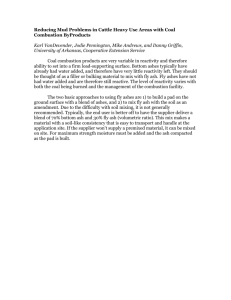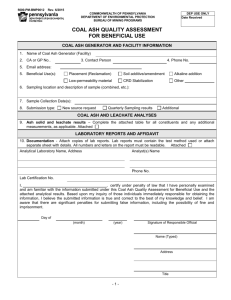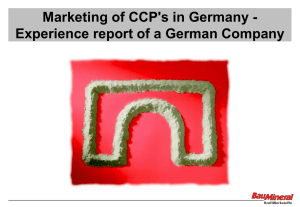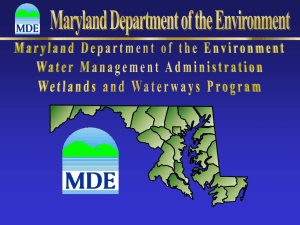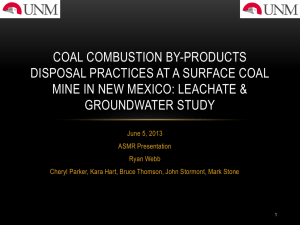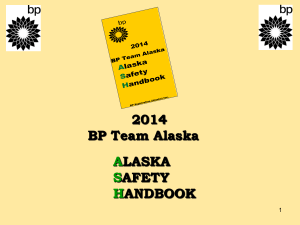Norman Harvey
advertisement
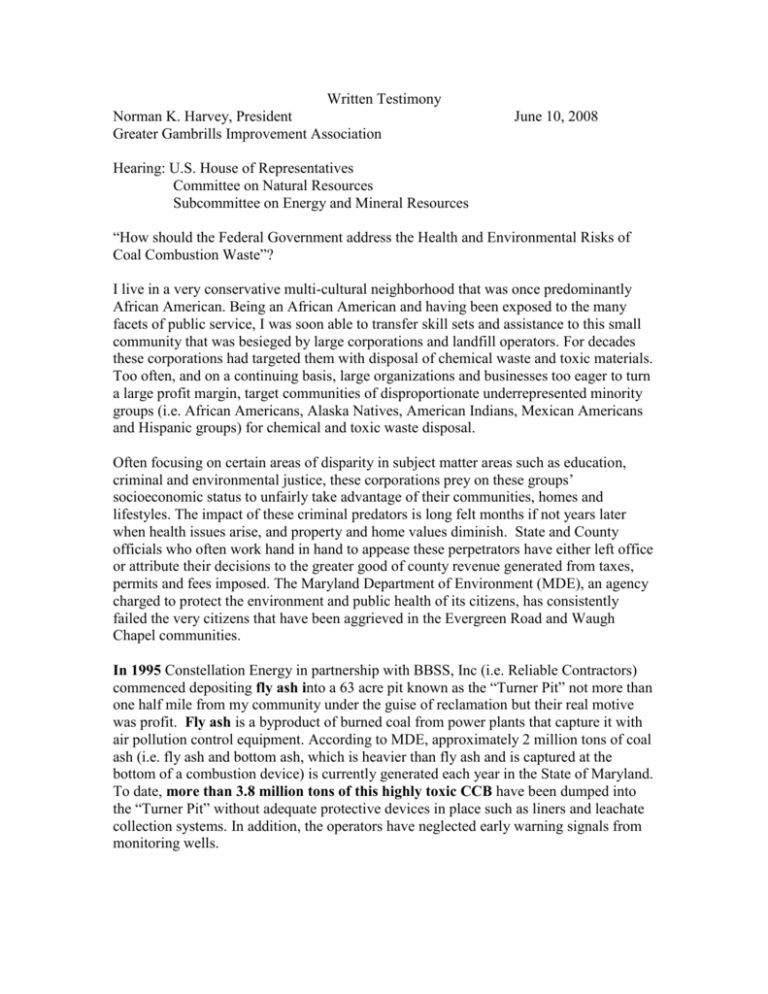
Written Testimony Norman K. Harvey, President Greater Gambrills Improvement Association June 10, 2008 Hearing: U.S. House of Representatives Committee on Natural Resources Subcommittee on Energy and Mineral Resources “How should the Federal Government address the Health and Environmental Risks of Coal Combustion Waste”? I live in a very conservative multi-cultural neighborhood that was once predominantly African American. Being an African American and having been exposed to the many facets of public service, I was soon able to transfer skill sets and assistance to this small community that was besieged by large corporations and landfill operators. For decades these corporations had targeted them with disposal of chemical waste and toxic materials. Too often, and on a continuing basis, large organizations and businesses too eager to turn a large profit margin, target communities of disproportionate underrepresented minority groups (i.e. African Americans, Alaska Natives, American Indians, Mexican Americans and Hispanic groups) for chemical and toxic waste disposal. Often focusing on certain areas of disparity in subject matter areas such as education, criminal and environmental justice, these corporations prey on these groups’ socioeconomic status to unfairly take advantage of their communities, homes and lifestyles. The impact of these criminal predators is long felt months if not years later when health issues arise, and property and home values diminish. State and County officials who often work hand in hand to appease these perpetrators have either left office or attribute their decisions to the greater good of county revenue generated from taxes, permits and fees imposed. The Maryland Department of Environment (MDE), an agency charged to protect the environment and public health of its citizens, has consistently failed the very citizens that have been aggrieved in the Evergreen Road and Waugh Chapel communities. In 1995 Constellation Energy in partnership with BBSS, Inc (i.e. Reliable Contractors) commenced depositing fly ash into a 63 acre pit known as the “Turner Pit” not more than one half mile from my community under the guise of reclamation but their real motive was profit. Fly ash is a byproduct of burned coal from power plants that capture it with air pollution control equipment. According to MDE, approximately 2 million tons of coal ash (i.e. fly ash and bottom ash, which is heavier than fly ash and is captured at the bottom of a combustion device) is currently generated each year in the State of Maryland. To date, more than 3.8 million tons of this highly toxic CCB have been dumped into the “Turner Pit” without adequate protective devices in place such as liners and leachate collection systems. In addition, the operators have neglected early warning signals from monitoring wells. State and County officials were well aware of the probability of groundwater contamination due to earlier contamination of the Brandon Woods/Solley Road residential community seven years earlier. The Turner Pit project was approved by MDE just as the Brandon Woods project with the knowledge that severe ground water and aquifer contamination was an immediate threat of endangering the health of its citizens. In June of 1999, MDE was made aware of groundwater and aquifer contamination above the 500 mg/l (milligrams per liter) permit limit for sulfates. MDE and the County Health Officer allowed continued operations; disregarding public health threats to the Evergreen and Waugh Chapel communities. Had a site specific analysis been conducted prior to commencing operations and the prior knowledge of the Brandon Woods/Solley Road disaster taken into consideration, this second incident of fly ash contamination would have been avoided by having the proper safeguards in place. A site analysis would have revealed that the acidity of the groundwater causes a greater acceptance to contamination without leachate systems and liners in place. In 2000, MDE allowed special exceptions for extending the operation to an adjacent pit known as the “Waugh Chapel Pit”; disregarding specific findings and knowledge of leachate contamination at the first site including airborne contamination of fly ash particles. It has been estimated that the sites have generated more than $15 million dollars profit in taxes, permits and fees for Constellation Energy (a $19 billion dollar a year energy giant) and Reliable Contractors. In 2004 a pump and treat system was installed at the “Turner Pit” to stem the tide of leachate plume down gradient from the site; however three residential wells already indicate high concentrations of calcium and potassium which are precursors to leachate migration, in addition to abnormal levels of aluminum being recorded. It is a fact that potentially cancer causing sulfates have been discharged into residential well water three times higher than EPA regulated safe standards. In October 2006 test wells indicated 4,480 mgl/l at the Waugh Chapel site and operations were allowed to continue under existing MDE and County scrutiny. Some residents were forced to depend on garden hoses and pipes attached to fire hydrants for water, in addition to being furnished 12 ounce bottled water by Constellation Energy during the winter season. In June 2007, according to a report by Maryland’s Department of Natural Resources, 34 residential wells were contaminated with toxic elements including arsenic, lead and cadmium at levels as high as three times EPA’s maximum standard for safe drinking water. In September 2007 Constellation Energy voluntarily issued a “Consent Decree” to stop fly ash deposits after the site had been 90% filled, however the Waugh Chapel residents still rely on 12 ounce bottled water for their drinking needs. Historically, across the nation and particularly in underrepresented areas, large waste producing corporations have sought old mining shafts, sand and gravel pits for fly ash disposal sites with little or no regard for public safety. The problem does not lie primarily with the waste product but the lack of proper safeguards and poorly regulated controls and ordinances. In 1993 EPA under the Federal Resource Conservation and Recovery Act (RCRA) made a determination that it would no longer regulate coal combustion waste (i.e. coal ash/fly ash) as a hazardous waste. In doing so, EPA gave license to existing state waste managers who were not qualified nor equipped to adequately safeguard public safety or public drinking water. Over the years, MDE has allowed loose interpretation of the EPA determination and nonenforcement of the same laws as necessary for industrial solid waste landfills. In addition, MDE fore-goes critical individual site review and environmental site analyses for permit applications. One study indicated that such reviews are critical for spotting potential hazardous conditions to communities and homeowners who are dependent on groundwater as a drinking water source or as in the case of the Crofton Area Township which relies on three aquifers for public drinking water as well. It is and has been determined that MDE should have required a site liner and leachate collection systems prior to the Turner and Waugh Chapel operations, but again the Maryland watchdog agency in place failed to protect the very citizens who depended on them for their public safety and health. Currently, MDE is in the process of re-writing proposals and regulations for stricter disposal of fly ash but without the participation of local citizen groups and environmental justice organizations most affected and that would benefit from such partnership. Environment Maryland along with Crofton 1st are organizations that would prove most beneficial to MDE’s newly proposed Coal Combustion Byproduct regulations by working with the county and state to (1) allow community and public involvement in the rulemaking process and (2) ensure that new legal requirements covering the use of fly ash in landfills and abandoned mines are adequately protective for underrepresented communities that have long been the targets for chemical and toxic waste disposal. The term, “beneficial use” of coal ash must be redefined from roadway fill, highway embankments, soil conditioner usage and with greater measures to ensure that it is mixed with or used as a bonding agent to prohibit environmental/public exposure. Federal, State and County officials must safeguard the general public and any close lying communities from fly ash particles in ambient air. Open fields of fly ash particles generate clouds of dust often coating nearby residential homes and cars. Operating permits should include plans for monitoring coal dust and stringent enforcement. Also, any existing CCB facilities should not be grandfathered or allowed to expand under old existing permits and/or granted special exceptions as currently and previously been the norm. Once protective systems are in place (i.e. liners and leachate systems) it should be certified and verified by federal, state and/or county officials to ascertain that it meets all necessary requirements. Officials on site must guarantee correct liner thickness and proper placement prior to any fly ash deposits. Most importantly, it is of my opinion that statutory mandates should be enacted instead of regulations now currently being developed or proposed. As seen in the past, regulations can often be administratively changed, but statutory mandates that are voted into law are not susceptible to quick change by administrative/county officials as is currently the case. In closing, I would like to see a special delegate for future rulemaking processes in the A.A. County assembly and elected by the citizens with a defined role to raise environmental issues that have so grossly been ignored by State and County officials. Notwithstanding, I would also organize a citizen watchdog steering committee entitled PECCL (the People’s Environmental Coalition for Cleaner Living) that would work with that special delegate and serve to ensure that these unfortunate events would indeed be a thing forever of the past for citizens in Anne Arundel County. Norman K. Harvey
